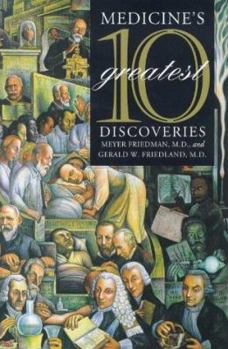Medicine's 10 Greatest Discoveries (Yale Nota Bene)
Select Format
Select Condition 
Book Overview
In 1675, Antony van Leeuwenhoek, an unlearned haberdasher from Delft, placed a drop of rainwater under his microscope and detected thousands of tiny animals in it. Leeuwenhoek proceeded to examine the... This description may be from another edition of this product.
Format:Hardcover
Language:English
ISBN:0300075987
ISBN13:9780300075984
Release Date:November 1998
Publisher:Yale University Press
Length:263 Pages
Weight:1.40 lbs.
Dimensions:1.0" x 6.4" x 9.6"
Customer Reviews
5 ratings
Creativity and Innovation
Published by Thriftbooks.com User , 24 years ago
The authors describe details related to the background of what they view as the 10 greatest medical "discoveries", one per chapter. The final chapter explores possible overlapping triggers for innovation among the discoveries: 1. individual or team effort 2. likeability of innovator (most you'd not invite for dinner) 3. funding (individual or government) 4. innovation: planned or sheer luck 5. the role of perseverence, determination and honesty 5... many moreInteresting conclusions emerge that will surprise many. This non-technical book is an easy read for all. It's a delight to discover it's full of useful gems of information, many of which many M.D.'s are not aware of (including 2 or more of the 10 greatest medical discoveries).
Thinking "Outside the box".
Published by Thriftbooks.com User , 25 years ago
An old puzzle requires connecting a square of dots by drawing three connected straight lines. The simple solution, which most people do not consider, depends on extending one line outside the boundary of the dots. The scientists and physicians described in Medicine's 10 Greatest Discoveries frequently had the ability to think "outside the box". They looked at the same data as others, but they saw new and important relationships. What impresses the reader is, not the brilliance of many of the discovers, but their ability to recognize the importance of data that most would consider trivial. These great discoverers were often not likable or engaging personalities; their commitment to their field was frequently obsessive; their social relationships stunted and their great discoveries depended, not so much on brilliance, but more on their enduring curiosity. The book makes compelling reading, because it is not only a history of discovery but also of the querky personalities of a number of the discoverers. The authors skillfully draw conclusions from limited historical data.This book has charm. The reader partakes of the naïve thought that just, maybe, if he had been there, he could have made the same discovery but that he probably would not have wanted to socially "pay the price". This book is like a delicious low calorie meal. How often can one learn a great deal about interesting personalities and events and thoroughly enjoy the experience?
Medicine made understandable
Published by Thriftbooks.com User , 26 years ago
Drs. Friedland and Friedman have taken a tremendously complex area of life, medicine and the adventure of discovery, and have made it understandable for the layperson, without making it simplistic. Their book is readable and engaging and takes the non-medical person on the intellectual adventure of exploration. When I read about the discoveries of the past, I could only but imagine the excitement of the medical discoveries of the future. Drs. Friedland and Friedman have opened up new vistas. Thank you!
Modern medicine told through its ten greatest discoveries
Published by Thriftbooks.com User , 26 years ago
As we approach the end of the second millenium there will undoubtedly be many books, magazine articles and editorials on the greatest discoveries, people and events that have shaped the world. "Medicine's 10 Greatest Discoveries" is the place to start for someone interested in understanding the evolution of modern medicine. Drs. Friedman and Friedland have written an understandable history of medicine similar to Richard Rhodes' Pulitzer Prize winning effort "The Making of the Atomic Bomb" in which the author teaches physics as we see it through the lives of the principal practioners of the art. Discovery of vaccinations, surgical anesthesia, diagnostic x-rays, antibiotics, and genetic engineering have changed the face of the world, both improving our lives, and creating new questions. Reading about these legends of medicine gives us insight into the personal and intellectual qualities required to make such discoveries. The authors have done a great service if their book stimulates a young person to pursue answers to the questions of the next millenium. I thoroughly enjoyed the book, finishing it in two evenings. My favorite chapter was on Maurice Wilkens and DNA, where ambition, pride, greed and awesome intellect combine to elucidate the structure and function of the gene, the "most significant discovery of the twentieth century". Christopher H. Joy
A true classic!
Published by Thriftbooks.com User , 26 years ago
Drs' Friedland and Friedmans' "Medicine's 10 Greatest Discoveries" is an incomparable book that belongs on the bookshelf of every public library, High School and University, as well as every family with children. This is an amazing book, in its easy readability and uncanny insights of its authors into the minds of Medicine's greatest discovers stretching back 400 years. Who knew that DNA was actually described in the 1700's? Or how slowly the knowledge of the human Anatomy was unearthed? This book will make a wonderful gift for any enquiring young mind and act as an inspiration to budding scientists and researchers. The authors have done the world a great service with their meticulous anecdotes. My ONLY criticism of the book is the inclusion and acceptance of Cholesterol as one of the ten greatest discoveries. The subject of Cholesterol and its importance in our nutrition remains very contentious and debatable - as evidenced by the increase in diabetes, obesity and hypertension sinc we embarked oa a fat-free eating frenzy over the past fifteen years. Henry Novis M.D.





